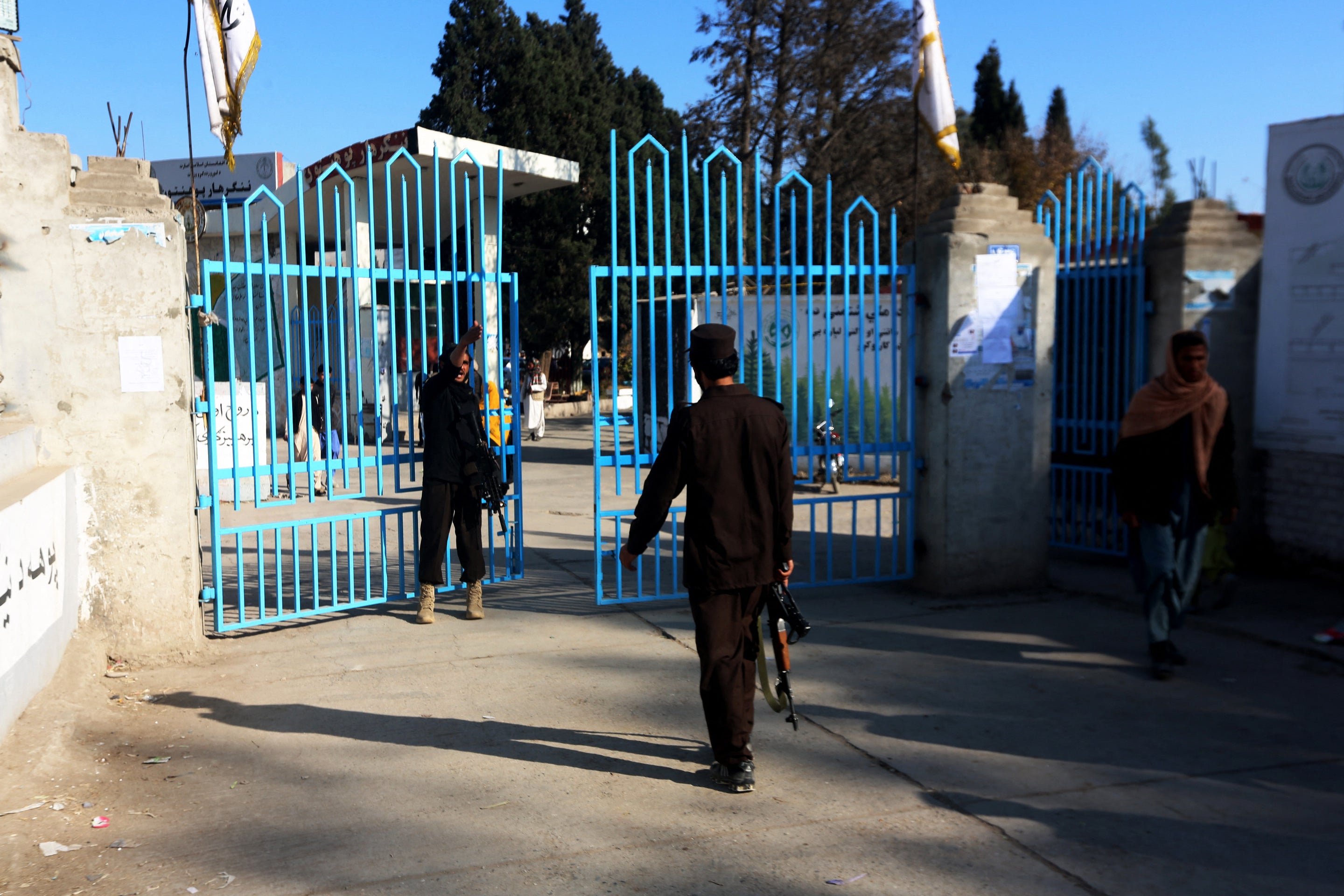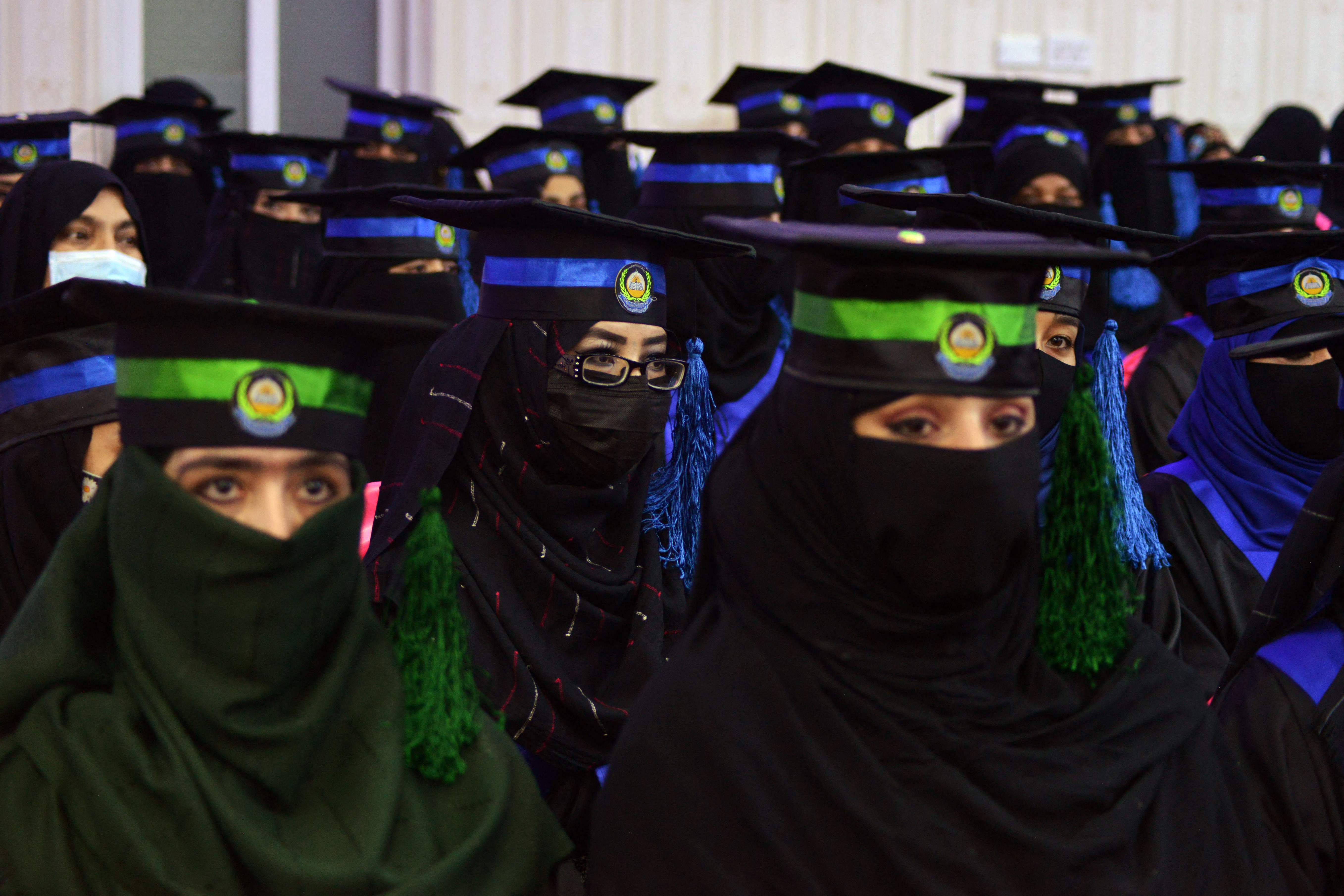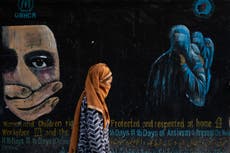‘Back to the 90s’: Taliban fighters ‘point guns at women’ and tell them to go home after shutting universities
The militant group was only showing a softer side earlier to get the Doha Peace Deal that contributed to their return to power, a former official from the previous Afghanistan administration tells Arpan Rai


Taliban fighters have taken to pointing their guns at women students who sought to enter universities and told them to go back to their homes, in an echo of the rulers’ past policies from the Nineties, experts have told The Independent.
“A female student told me this morning that as she was heading to Kardan university in Kabul, the boys were allowed to enter the gates but the Taliban pointed their guns at the girls and told them to go home,” said Shabnam Nasimi, the former policy special adviser to the minister for Afghan resettlement and minister for refugees.
One female student seeking entry back into the university also attempted to take her life, according to Salma Niazi, the editor of The Afghan Times, who spoke to The Independent from Kabul.
Accounts of these two incidents have come just a day after the Taliban banned all female students from universities across Afghanistan.
Tuesday’s sweeping order, which will remain law until further notice, has sparked widespread anger in the country and the world.
By keeping the doors of high schools, and now universities, shut for women, the hardline insurgents have been accused of running an administration that effectively tramples over the basic rights of Afghans and is a complete reversal of an earlier promise that their rule this time would be different.
Scores of women students have been left in shock after seeking entry back into colleges and universities on Wednesday.
“A student tried to die by suicide in front of Nangarhar University but was saved by her friends. One of our reporters found out that the student was very sad,” Ms Niazi said.
Visuals from one university in Kandahar showed women students having to forcibly leave while the male students were seated inside the classroom, while another showed students crying after being asked to go back.
One video showed male students protesting the Taliban’s latest edict in solidarity with women students at Nangarhar University in the eastern province of the same name bordering Kabul.
Former officials who worked in the US-backed administration have said the order further confirms the Taliban has come full circle with respect to their previous hardline rule in the Nineties.
“The international community should realise that the Taliban have not changed. They were only playing soft to win the Doha peace deal that contributed to their return to power,” said Dr Qasim Wafayezada, the former minister of information and culture in the Ashraf Ghani administration.
The Taliban had wrested control from the administration by force last August after the US pulled out of the country.
The Doha peace agreement, struck between the US and the Taliban in February 2020, stated the US would reduce its troop presence while the Taliban pledged its territory would not be used by any of its members, other individuals, or terrorist groups.
As of today, the Taliban have erased the presence of women from Afghan society and pushed Afghanistan into the grip of the darkest forces in the region, Dr Wafayezada told The Independent.

“The Taliban not only haven’t changed, but they have grown more radical with a new generation of hardline Islamists gaining more eminence and importance within their ranks and files.”
He also said they had successfully rolled back all progress the country had made in the last 20 years.
The recent university education suspension order for Afghan women students showed hardliners within the Taliban leadership were able to establish a dominant position and win internal clashes, he explained.
Dr Wafayezada also said some figures among the Taliban were supportive of girls’ education, but remain weak and marginalised by the central leadership of Hibatullah Akhundzada.
“It has been known for the past one and a half years that the Taliban intended to use girls’ education as a bargaining chip with the international community. But apparently, this approach has backfired and only earned them international condemnation,” he said.

Ms Nasimi, who escaped the Taliban more than two decades ago, said she didn’t “believe this Taliban regime is any different from who they were in the Nineties”.
The “extremist fundamental Islamist group” have turned Afghanistan into a pariah state and have no value for basic human rights, she said.
Of what is left of Afghanistan under the Taliban, the world should expect the closure of the remainder of Afghan media outlets which the regime has been trying to turn into mere propaganda machines of their government, Dr Wafayezada said.
“The Taliban, since their return to power, has abolished the constitution and continue to reject any sort of participatory politics and constitutional order. They preach democracy as the evil of the West,” he said.
Ms Niazi also warned that “if the international community does not take quick steps against the Taliban, its fighters will also take away the right to life of Afghan women”.
Join our commenting forum
Join thought-provoking conversations, follow other Independent readers and see their replies
Comments




Bookmark popover
Removed from bookmarks